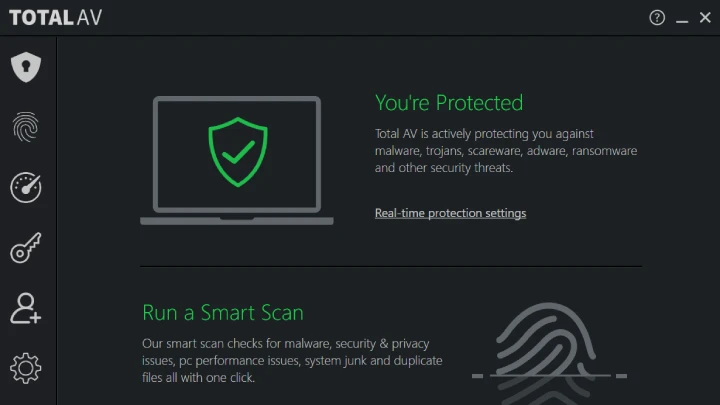
Deciphering Adware: Recognizing Dangerous Pop-Ups & Learning Secure Eradication Methods

Deciphering Adware: Recognizing Dangerous Pop-Ups & Learning Secure Eradication Methods
A massive amount of online revenue comes from advertisements. Google gets 95% of its income from online advertising. Companies often have online ad campaigns to push their products and services to potential customers. You encounter as many as 1,700 banner ads per month. As such, catching your attention is a top priority of ads. Eventually, the adware was born.

Stay malware-free with reliable antivirus
Don’t compromise your Data and Privacy. TotalAV is a top-notch antivirus program that handles various viruses, trojans, and other malware that may target your devices. It will safeguard your devices and enhance your system performance.
4.9/5
⭐ Editor’s Choice
✔️ Excellent Malware Detection
✔️ Multiple set of Features
✔️ 30 Day Money-Back
Adware is a type of grayware. A grayware is a “potentially unwanted programs.” Imagine it as a step below malicious software. It may not directly harm your computer. But, it still affects your system. More often than not, grayware is just annoying. Unfortunately, they can be used by hackers for further damage.
Surf the Web and watch Videos without Ads with TotalAV
Includes Total AdBlock Pro (value $29 for free)
Disclaimer: This post includes affiliate links
If you click on a link and make a purchase, I may receive a commission at no extra cost to you.
What is Adware

Adware is short for “advertisement software.” Apparently, aims to catch your attention in any way it can. Pop-ups, banners, toolbars, and alerts are classic adware activities. More aggressive methods are recently found online as well. It exists both as an online entity and a desktop application.
The mobile version of adware is called madware. It functions similarly to adware. Additionally, it can even send you unlimited text and chat messages to entice you to buy products.
What does Adware do on your Computer?
In itself, adware is not dangerous. It is merely irritating because of its intrusive methods. It can be an efficient way to market products when used efficiently and ethically.

However, adware eats up system resources just like any application. For example, infinite pop-ups require your browser to take up more memory. It eventually affects your browsing activity. Pop-ups may even use bandwidth and data.
Desktop adware slows down your system significantly. It uses up the limited processing power of your computer. Adware exhausts your computer memory making the OS sluggish and even freezing.
It also affects your data usage. Adware downloads photos and videos to create eye-catching ads. It could eventually use up valuable data on your Internet data plans. It happens especially when you are on mobile.
Why is Adware Dangerous?

Hackers use adware as an effective way to make you click or run malware. Seeing a good deal online, “winning” a lottery, or catching your attention with unique products takes advantage of your interest. Adware can be used together with spyware. It tracks your activities including keystrokes on your keyboard, and screenshots of your workspace, and even gather sensitive information.
Some adware may collect data from your browsing habits. It is then used to create targeted advertisements based on your interest. For example, ads may suddenly show bags or shoes if you’ve recently used your browser to search for those items.
How do you get Adware?

There are countless ways that you can get adware. Some legitimate freeware or shareware comes with adware during installation. It is typically a way of generating revenues. The developers are paid a certain amount when users click on the advertisements.
Sometimes, you install toolbars or extensions that come with adware. It inserts itself during your browsing. Adware may also become a part of an add-on’s interface.
Malicious websites can also install adware on your system. Hacker methods are typically employed. Trojans can be used to “inject” adware on your PC. Usually, it goes unnoticed more often than not.
How to Prevent Adware?
Having a good, clean browsing habit protects you from adware. However, you cannot wholly escape adware. However, there are a few things you can do to avoid the annoying and potentially dangerous ones.
Block Pop-Ups on Browsers
Here’s how to block pop-ups on various web browsers:
Google ChromeMozilla FirefoxMicrosoft Edge
Block Pop-Ups On Chrome
Launch Chrome browser and navigate to the: chrome://settings/content/popups.
If you want to completely block the pop-ups on the Chrome browser, enable the Don’t allow sites to send pop-ups or use redirects below the Default behavior.

This will block all the pop-ups appearing on your browser.
If you don’t want to block every pop-up and only want to stop pop-ups of some selective websites, click on the **Add**button next to Not allowed to send pop-ups or use redirects.

On the contrary, if you want to allow websites from some specific websites, click on the Add button next to Allowed to send pop-ups and use redirects.

Block Pop-Ups On Firefox Browser
- Launch the Firefox browser and navigate to the: about:preferences#privacy
- Scroll down and enable the Block pop-up windows option under the Permissions heading.

- If you want to allow some websites to display pop-ups, click the Exceptions button.

- On the next window, enter the website address for which you want to allow the pop-ups, click on Allow, and then Save changes.

Block Pop-Ups On Edge Browser
- Launch the Edge browser and navigate to the: edge://settings/content/popups.
- If you want to completely block the pop-ups on the Chrome browser, toggle the button next to Block (recommended) to switch it ON.

- If you don’t want to block every pop-up and only want to stop pop-ups of some selective websites, click on the Add button next to Block.

- On the contrary, if you want to allow websites from some specific websites, click on the Add button next to Allow.

Install Ad Blockers

Another way to protect you from adware when browsing is to install an ad blocker add-on. A good example is Adblock Plus . It effectively blocks banners and annoying pop-ups on web pages. Additionally, it stops adware tracking and other potential malware. It can even prevent social media buttons. Adblock Plus balances blocking intrusive ads and allowing acceptable ones. You can customize which ads and sites to block and allow.

Ghostery is another good option for protecting you online. It claims to optimize the web page by blocking annoying ads. It has a clean and easy-to-understand user interface. You can quickly add a trusted website. Moreover, you can pause ad blocking in case you need to. It also anonymizes your data to avoid tracking.
Install Anti-Malware

The most effective way to protect your system from all types of adware is to install robust anti-malware. The above options work on browsers. However, the only way to block desktop adware is to have a security program.
MalwareFox is an excellent choice for blocking adware and much, much more. Hackers often use adware to gain a foot in your system. The anti-malware system analyzes all executable files in your machine. It efficiently targets malicious files including possible adware. It will remove even those unknown threats.
Moreover, it helps you maintain a good browsing experience. It eliminates annoying ads, toolbars, and adware online. It ensures that nothing goes through your protection.
Surf the Web and watch Videos without Ads with TotalAV
Includes Total AdBlock Pro (value $29 for free)
How to Remove Adware?
Adware can get through your system even with the most reliable protection. It is because some adware is non-intrusive. Some security suite comes with adware. You may notice occasional pop-ups about your antivirus from time to time. These are not harmful.
You may have to uninstall the offending program if the ads annoy you. Sometimes it is not possible to block adware entirely on your computer.
Run a scan using your antivirus. It will analyze your system for any harmful adware. Drag and drop suspicious files or folders to perform a Deep Scan, which ensures that there is no infection.
Final Thoughts
Adware is quite helpful when used correctly and ethically. Advertisements have been a part of modern life since the inception of marketing. However, it is essential to know that adware is also a gateway to your computer. Hackers use it to install more robust malicious programs. Ensure layered security and safe browsing and downloading habits.
2 thoughts on “What is Adware?”
Daniel Akinjare
March 27, 2018 at 1:58 am
I love it
Reply
2. Pingback: Apple Security Is Not As Tough As You Thought It Was - MalwareFox
Leave a Comment Cancel reply
Comment
Name Email
Save my name, email, and website in this browser for the next time I comment.
Δ
Also read:
- [New] Clearing the Darkness Remedies for Invisible Gaming Captures by OBS
- [Updated] In 2024, DSLR's Place Among Mirrorless Cameras for Videos
- 11 Best Location Changers for Poco M6 5G | Dr.fone
- Alternative Methods for Saving Your Office 365 Mail: Avoid Using Outlook
- Come Connettere Il Tuo Outlook Al Gmail per Una Migliore Organizzazione Degli E-Mail
- Das Problem Mit Dem Beschädigten C-Laufwerk in Windows 지원: Datenschutzstrategien & Reparatursmöglichkeiten
- Die Besteue Methode Zur Installation Von Windows 11 Auf Einem Ghost-UEFI-System - Expertenrat
- Discover the Top 3 Techniques to Enable Offline File Access on Windows Prise Newsletter
- Easy Guide to Acquiring and Installing Corsair K70 Software/Drivers for Your PC
- Effective Solutions for the IIoT Server Flaw (CVE-2022-41091) Security Patch Strategies
- Efficiently Building a Clonezilla USB Drive: Comparing Rufus and Other User-Friendly Options
- Effortless Steps to Install an SSD Drive in Windows 11 Systems
- How To Update or Downgrade iPhone 15 Pro Without Losing Anything? | Dr.fone
- IFind's Top Picks: Ultimate List of 5 Leading Programs to Recover Unrecognized, Allocated and Deleted Sectors in Windows/macOS Systems
- In 2024, A Step-by-Step Guide on Using ADB and Fastboot to Remove FRP Lock from your Samsung Galaxy F15 5G
- Navigating the New Era with PowerDirector App 2024 Edition
- Section 4A: Advanced Topic - Ocular Immunology
- Snapedit A Beginner's Guide to Photo Mastery
- Understanding Bad Pool Callers: Identifying Origins, Thwarting Occurrences & Ensuring Restoration
- Title: Deciphering Adware: Recognizing Dangerous Pop-Ups & Learning Secure Eradication Methods
- Author: Scott
- Created at : 2024-10-28 18:14:58
- Updated at : 2024-10-31 19:34:55
- Link: https://win-comparisons.techidaily.com/deciphering-adware-recognizing-dangerous-pop-ups-and-learning-secure-eradication-methods/
- License: This work is licensed under CC BY-NC-SA 4.0.








